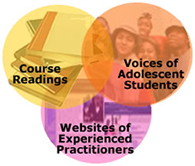
LEARNING
ABOUT ADOLESCENTS FROM TEACHERS WHO TEACH THEM WELL
Anna
Richert • Mills College, Oakland, CA • Adolescent
Development
| HOME PAGE |
| The Class |
| Syllabus |
| Assignment |
| The Context |
| Program |
| Institution |
| Archive |
| Arroyo Video |
The
course context The Adolescent Development class where I experimented using the Carnegie materials is a one semester course at Mills College in Oakland CA. The course falls during the first semester of a fifth-year credential program. The students are first year MA students beginning their professional preparation. As the Venn diagram illustrates, I incorporated the Carnegie materials into the course as one of three “texts” we considered during the semester. Whenever possible I created activities that asked students to reflect on the three texts simultaneously---the readings, the voices of adolescent students and the Carnegie teachers. |
||||||||||||
|
My
teacher
education dilemma A dilemma I face in teaching Adolescent Development is how to make it clear to my students why learning about adolescent development is so critically important to secondary school teaching. Whereas it is obvious to most students that to teach adolescents well one has to know them well, it is less clear what “knowing them” might mean and/or look like when it comes to teaching practice. It is also not so clear how a practicing teacher might accomplish the complex task of getting to know her students while simultaneously teaching them. As hard as it is to understand these ideas about teaching, it has been equally challenging to figure out how to teach these ideas in my Adolescent Development class. |
| ||||||||||
|
||||||||||||
My guiding questions
|
||||||||||||

